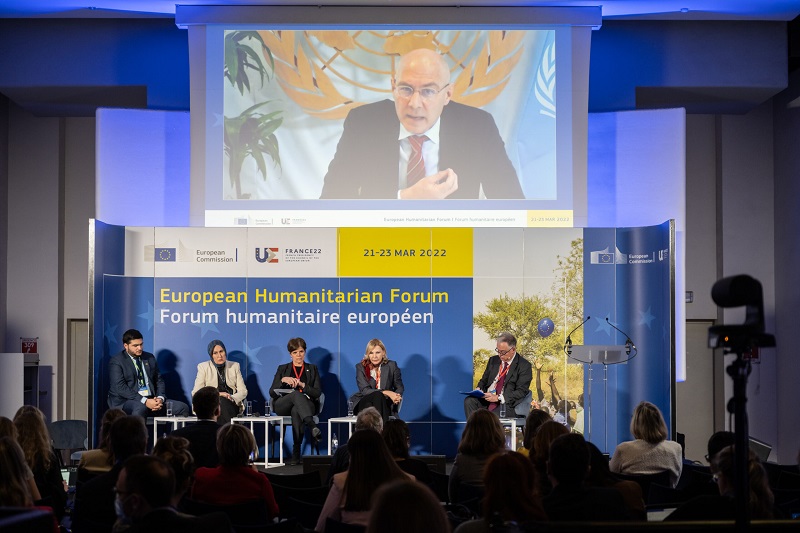First European Humanitarian Forum: improving assistance and collaboration to address needs

Jointly organised by the French Presidency of the Council of the EU and the European Commission, the European Humanitarian Forum (EHF) on 21-23 March focused on many of the most pressing global issues. At a time of unprecedented humanitarian needs, record numbers of displaced people, and the impacts of climate change pushing the humanitarian system to breaking point, more needs to be done to find sustainable solutions to protracted crisis, better anticipate disasters, invest in local capacities and effectively implement the nexus approach through increased collaboration between humanitarian, development and peacebuilding actors.
Among the key partners invited to the forum, the International Federation of Red Cross and Red Crescent Societies (IFRC) was represented by two Under Secretary Generals who contributed to panels on climate change, localisation and humanitarian leadership. In addition, six National Societies from the EU spoke at sessions on a wide range of topics, including innovative financing, crisis communication and addressing mental health and psychosocial support needs in humanitarian settings.
While recognising its absolute necessity, forum participants acknowledged the localisation agenda’s limited progress. Calls were made to develop equitable partnerships with local actors by working with local governance structures and local networks to build community trust and resilience. The European Commission Directorate-General for European Civil Protection and Humanitarian Aid Operations’ (DG ECHO) upcoming guidance on localisation will be an important opportunity to further elaborate these actions. As the Czech Republic takes over the Presidency of the Council of the EU in July, its priorities will include engaging local actors in disaster risk reduction and climate action in a more systematic way and to ensuring learning from partnerships.
With the growing impacts of extreme weather events worldwide, climate change was another central topic during the forum. Several speakers referenced the Climate and Environment Charter as an important framework to mobilise and guide humanitarian action in the face of the climate and environment crises. DG ECHO announced its support for the Charter, confirming that the European Commission will scale up support to climate risk management and anticipatory action. The Humanitarian aid donors’ declaration on climate and environment was also announced – a commitment to invest more to prevent, prepare for, anticipate and respond to disasters, as well as to improve cooperation and partnerships between stakeholders, and increase efforts to reduce the environmental impacts of humanitarian action. The Head of the Climate and Conflict unit at the Red Cross Red Crescent Climate Centre, Catalina Jaime, recalled the evolution of the anticipatory action and underlined how science, policy and practice must collaborate. However, as called for by several forum participants: even when the best information is provided, people need to understand it and be ready to act.
Naturally, the humanitarian effects of the armed conflict in Ukraine were present throughout the forum discussions. International Humanitarian Law violations, concerns about humanitarian space and access, as well as the need for a consistent approach to humanitarian exemptions from sanction regimes to enable principled humanitarian action were all brought to the forefront. In a session dedicated to discussing the situation in Ukraine, the Director General of Ukrainian Red Cross Society highlighted the humanitarian impacts on the most vulnerable people. He stressed medical and in-kind assistance to people trapped in besieged cities among the most pressing needs and emphasised the importance of health and economic security as longer-term areas of focus. Donors were asked to find additional funding for Ukraine so that resources are not shifted away from other crises and to refrain from using official development assistance (ODA) to finance the hosting of Ukrainian refugees domestically. In light of the ever-growing funding gap, DG ECHO urged all actors to increase humanitarian aid efficiency.
One of the areas highlighted by the DG ECHO with significant scope for better cost-effectiveness and greening was humanitarian logistics, as also outlined in DG ECHO’s new policy, which will be followed by more detailed guidance for partners. Spanish Red Cross Director for Disaster Management, Iñigo Vila, raised the need to invest in preparedness and stressed how International Disaster Response Law (IDRL) can help. He described the potential of the EU Host Nation Support Guidelines, as legal preparedness and reducing legal barriers are still not receiving adequate attention from the EU and Member States.
The European Humanitarian Response Capacity (EHRC) also aims to increase efficiency and fill gaps “when traditional humanitarian delivery mechanisms are ineffective or insufficient”. Alarmingly, from the perspective of a principled approach to humanitarian action, some Member States called for a stronger EU on the humanitarian stage and the need to go further with the EHRC. Ensuring that humanitarian aid and civil protection roles and mandates remain separate is paramount. The European Commission announced EHRC deployments to Ukraine, tapping into the emergency teams, pre-positioned stockpiles of relief items, and potentially transporting relief items with a humanitarian air bridge. It will be important for humanitarian actors to continue to engage with DG ECHO on this topic, as limited consultations have taken place with humanitarian partners on the development of the EHRC so far.
The Co-Hosts Statement by the European Commission and the French EU Presidency gathered the forum’s key recommendations and calls for action. It will be up to the Swedish Presidency to follow up and take stock in the next forum in 2023. The humanitarian community, including the IFRC and National Red Cross Societies in the EU, will be keen to prepare the event together and contribute as actively as they did this year.
Additional reading: RCRC Climate Centre: First European humanitarian forum flags ‘dramatic impact of climate change’
For media inquiries, please contact Eva Oyón on: eva.oyon@redcross.eu or +32 2 235 09 22

